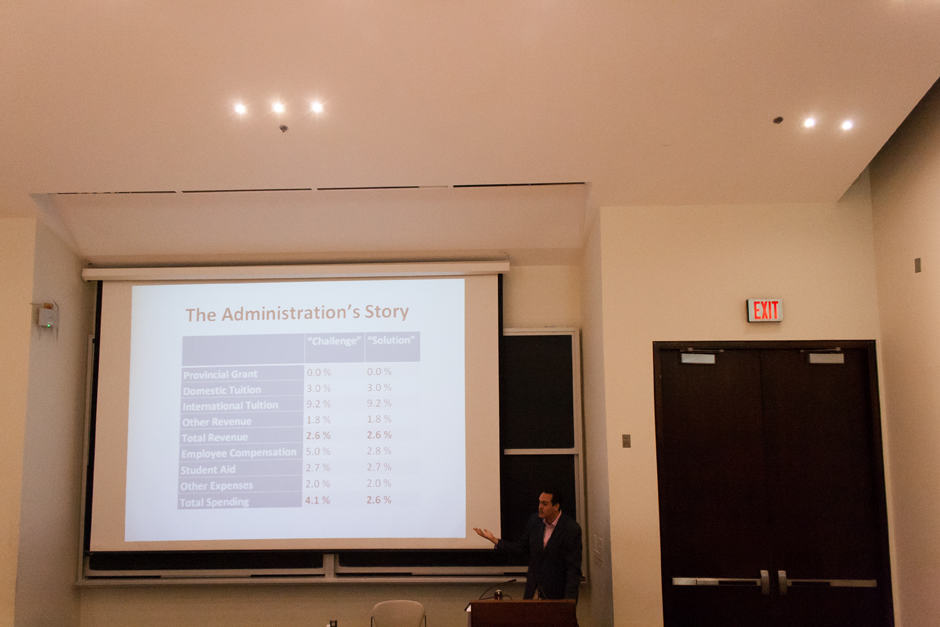University administration and the United Steelworkers (USW) Local 1998, which represents about 7,000 U of T staff, are working to reach a deal on a new employee compensation agreement before Monday, September 15 at 12:01 am. The new deal will replace the previous employee compensation agreement signed in 2011. If no deal is reached, there is the possibility of a strike or lockout, but neither party has announced plans for such measures at this point.
Last Friday, September 5, the strike deadline was extended from Monday, September 8 to September 15.
“The [last] collective agreement expired June 30. The Labour Relations Act allows the previous agreement to remain in force until you get to a legal strike and lockout position,” said Stuart Deans, Toronto area coordinator for USW Local 1998.
“If we are at 12:01 am and are making good progress; if we can see that we just need a few more hours or even a day to do it, we’ll extend that deadline on mutual agreement of the parties to get the thing done. But, if we are far apart and there is no chance that we can bridge that gap, then likely what that will lead to is a labour dispute and all of the facets that go with that,” Deans added.
Althea Blackburn-Evans, U of T director of news and media relations, said that university administration is doing all it can to reach an agreement that responds to the needs of both parties. “The university continues to negotiate in good faith with USW with the goal of reaching a renewed collective agreement that is responsive to employee interests and is also responsible in light of the ongoing financial constraints within which the university operates,” she said.
Blackburn-Evans’s sentiment was echoed by Deans. “Everybody goes into this process with the view of getting a deal that is both fair and responsible, and that is for both sides,” Deans said, adding: “If we had the power to bargain everything we want all of the time, there would be a tipping point as to whether or not there is an institution left at the end of the day. So there is recognition that both parties have to be responsible.”
“Austere proposals”
Details of the negotiations have not been released. However, USW economist Erin Weir accused the university of “making very austere proposals to our union, advocating a wage freeze.”
“Of course, that is sometimes the nature of bargaining: the administration will come in with a very extreme proposal and then we’ll negotiate from there. But certainly their starting point seems very draconian given the very positive state of the university’s finances,” Weir added.
At a USW budget analysis event on August 20, Weir discussed the U of T budget. He said that, while the university predicts growth of expenses will surpass growth of revenues over the next several years, they are operating with an annual surplus above $100 million in the short-term.
“Let’s say we accept all the university’s projections about how much revenues and expenses are on track to increase. What does that actually look like? Basically what you see is that…it takes six years to get to a deficit. So, yes, there is what the administration calls a structural challenge of projected expenses rising more than projected revenues, but we are starting with a pretty significant surplus… We are only actually talking about negotiating a three-year deal,” said Weir.
Effect on students
University of Toronto Students’ Union (UTSU) president Yolen Bollo-Kamara explained that the outcome of the negotiations would directly affect students.
“The working conditions of staff are the learning conditions of students. For example, the outcome of various labour negotiations could have an affect on the size of our tutorials. It could also affect whether or not Career Centre staff are trained professionals or less secure part-time workers who are not equipped with the tools to provide students with what we need,” she said.
According to Paul Tsang, president of USW Local 1998, there is a large degree of overlap between the student body and the USW membership. “U of T hires a lot of graduates, so these are the good jobs a lot of the students are going to get,” said Tsang, adding: “A lot of our workers are students. Probably a third of our casual [workers] are students: graduate students, TAs, research associates. So this is very much a student issue.”
Employee compensation and tuition fees
Although university administration did not specifically address the relationship between employee compensation and student tuition, both the UTSU and the USW said that there is no direct link between an increase in employee compensation and a rise in tuition fees.
“Correlating these two variables in a budget with far more revenue sources and expenditures is an unhelpful oversimplification,” said Bollo-Kamara, adding: “I believe that the university is capable of prioritizing access to post-secondary education and optimal working conditions.”
“It’s not like we are swallowing up 98.6 per cent of student costs into our terms and conditions of employment, and then at some point we have to go back to [the students] and say you have to start paying more fees. That’s not the equation at all,” Deans said.
Unless the deadline is extended, the two parties have until Monday, September 15 at 12:01 am to reach a deal.


